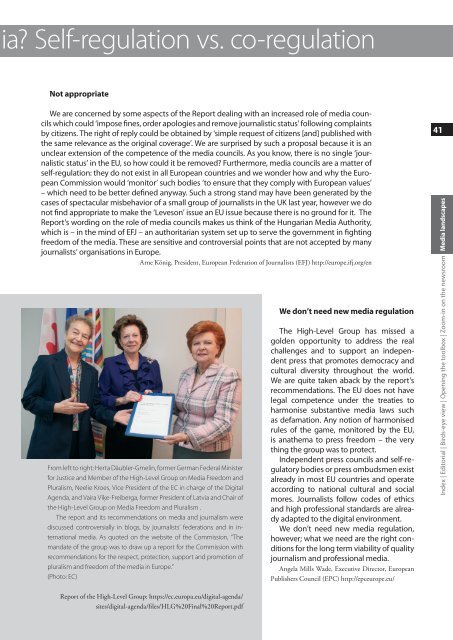MediaAcT
How fragile is media credibility? Accountability and transparency in journalism: research, debates, perspectives Final Research Report | Media Accountability and Transparency in Europe
How fragile is media credibility? Accountability and transparency in journalism: research, debates, perspectives
Final Research Report | Media Accountability and Transparency in Europe
You also want an ePaper? Increase the reach of your titles
YUMPU automatically turns print PDFs into web optimized ePapers that Google loves.
ia? Self-regulation vs. co-regulation<br />
not appropriate<br />
we are concerned by some aspects of the report dealing with an increased role of media councils<br />
which could ‘impose fines, order apologies and remove journalistic status’ following complaints<br />
by citizens. The right of reply could be obtained by ‘simple request of citizens [and] published with<br />
the same relevance as the original coverage’. we are surprised by such a proposal because it is an<br />
unclear extension of the competence of the media councils. As you know, there is no single ‘journalistic<br />
status’ in the EU, so how could it be removed? furthermore, media councils are a matter of<br />
self-regulation: they do not exist in all European countries and we wonder how and why the European<br />
commission would ‘monitor’ such bodies ‘to ensure that they comply with European values’<br />
– which need to be better defined anyway. such a strong stand may have been generated by the<br />
cases of spectacular misbehavior of a small group of journalists in the Uk last year, however we do<br />
not find appropriate to make the ‘leveson’ issue an EU issue because there is no ground for it. The<br />
report’s wording on the role of media councils makes us think of the hungarian Media Authority,<br />
which is – in the mind of EfJ – an authoritarian system set up to serve the government in fighting<br />
freedom of the media. These are sensitive and controversial points that are not accepted by many<br />
journalists‘ organisations in Europe.<br />
Arne König, President, European Federation of Journalists (EFJ) http://europe.ifj.org/en<br />
From left to right: Herta Däubler-Gmelin, former German Federal Minister<br />
for Justice and Member of the High-Level Group on Media Freedom and<br />
Pluralism, Neelie Kroes, Vice President of the EC in charge of the Digital<br />
Agenda, and Vaira Vīķe-Freiberga, former President of Latvia and Chair of<br />
the High-Level Group on Media Freedom and Pluralism .<br />
The report and its recommendations on media and journalism were<br />
discussed controversially in blogs, by journalists’ federations and in international<br />
media. As quoted on the website of the Commission, “The<br />
mandate of the group was to draw up a report for the Commission with<br />
recommendations for the respect, protection, support and promotion of<br />
pluralism and freedom of the media in Europe.”<br />
(Photo: EC)<br />
Report of the High-Level Group: https://ec.europa.eu/digital-agenda/<br />
sites/digital-agenda/files/HLG%20Final%20Report.pdf<br />
We don’t need new media regulation<br />
The high-level group has missed a<br />
golden opportunity to address the real<br />
challenges and to support an independent<br />
press that promotes democracy and<br />
cultural diversity throughout the world.<br />
we are quite taken aback by the report’s<br />
recommendations. The EU does not have<br />
legal competence under the treaties to<br />
harmonise substantive media laws such<br />
as defamation. Any notion of harmonised<br />
rules of the game, monitored by the EU,<br />
is anathema to press freedom – the very<br />
thing the group was to protect.<br />
Independent press councils and self-regulatory<br />
bodies or press ombudsmen exist<br />
already in most EU countries and operate<br />
according to national cultural and social<br />
mores. Journalists follow codes of ethics<br />
and high professional standards are already<br />
adapted to the digital environment.<br />
we don’t need new media regulation,<br />
however; what we need are the right conditions<br />
for the long term viability of quality<br />
journalism and professional media.<br />
Angela Mills Wade, Executive Director, European<br />
Publishers Council (EPC) http://epceurope.eu/<br />
1<br />
Index | Editorial | Birds-eye view | Opening the toolbox | Zoom-in on the newsroom | Media landscapes


